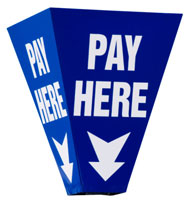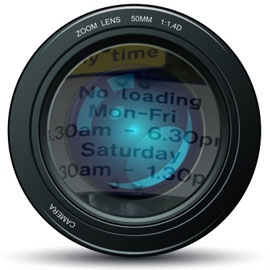 While every effort�s been made to ensure this article�s accuracy, it doesn�t constitute legal advice tailored to your individual circumstances. If you act on it, you acknowledge that you do so at your own risk. We can�t assume responsibility and don�t accept liability for any damage or loss which may arise as a result of your reliance upon it.
While every effort�s been made to ensure this article�s accuracy, it doesn�t constitute legal advice tailored to your individual circumstances. If you act on it, you acknowledge that you do so at your own risk. We can�t assume responsibility and don�t accept liability for any damage or loss which may arise as a result of your reliance upon it.
It's a hideous moment: you return to your car, van or motorbike to find a parking ticket on the windscreen or a clamp on the wheel; that's if you've not been towed away. This is a step-by-step guide to appealing unfair parking fines including free template letters to help.
In this guide
Step-by-step:
Also see:
Parking Ticket Appeal Successes,
Parking Ticket Appeal Discussions
Quick Do's & Don'ts before you start
DON'T assume every ticket is unfair
The parking laws are in place for safety and to help traffic flow, and should benefit us all. Yet mistakes happen, whether it's an unclear sign, technology faults, overzealous parking attendants or just an honest error. The aim of this guide is to prevent you being out of pocket, when most reasonable people would think the ticket is unfair.
Yet if you've blocked a school gate, parked on a zig-zag, or caused a huge traffic back-log by taking a break on a red run, sorry, there's no sympathy here and this guide isn't intended to help; and even if it did you'd have little chance of success.
DO check who your ticket's from
Parking tickets can be both from official bodies, like local councils and the police, or private companies. This guide is about official tickets. If you were ticketed on private land (e.g. a supermarket car park or a private road) it's likely to be a private ticket, so please read the Reclaim Private Parking Tickets guide.
Some private companies try and make their tickets look as much like official ones as possible, calling them PCNs (the term used by councils) or using chequered lines. Yet if it doesn't state the council or police force's name and doesn't say it's issued under an act of parliament, it's a private ticket.
DON'T assume the driver's responsible
Official tickets are the responsibility of the vehicle's registered owner, not the driver, unless issued to hire cars. If you�ve got a ticket while in a hire car, hire firms can either send you the payment demand or pay the ticket themselves and send you a bill, plus an admin fee. So if you you've got a ticket whilst driving a hire car and want to appeal it, let the hire company know.
DO act immediately
If you get a ticket you think is unfair then you need to act immediately, especially if you and your car are still in situ. This is both so you can gather evidence and because fines increase if you don't deal with them quickly. Yet most importantly...
Unless your car's been clamped or towed away, DON'T pay the ticket if you plan to appeal; as it's admitting liability.
DO print the Glove Box Parking Guide
Our printable A4 guide is packed full of tips on what to do if you're ticketed and how to avoid tickets by parking right in the first place. Print and keep in your glove box in case of the dreaded moment when a ticket's slapped on your windscreen, or worse, your car's clamped or been towed.
Should you appeal?
Usually pay the fine within 14 days and it's half price. For further info check out typical parking fines and the costs if you don't pay.
Even if you do start an appeal, and it's unsuccessful, while it's not guaranteed, you're often still allowed to pay at the half price rate within 14 days of the rejection. Help the chances of this by clearly requesting the fine to be put on hold in your appeal letter.
The chances of success
If you get all the way to the last, Independent Tribunal stage, the success rate is an extraordinary 70%, which means if you believe in the justice of your cause the odds are in your favour if you keep going, though it can be a slog.
Here's a few examples to give you inspiration (also read about Martin's appeal success in his Parking Fines blog).
MSE Guy had parked in his usual residents parking bay. No problem normally, except this day a sign had been placed quite a distance up the road to say it was suspended for a few days and the road name it gave was incorrect, rendering the sign invalid. Guy's appeal was twice rejected by his local council, but at the Independent Tribunal stage, the council didn't bother to put up a defence and it was uncontested so he won.
MoneySaver JWF: "I got a PCN issued by my council in July 08 and my first appeal was rejected. I heard nothing for a long time, then just before Xmas I received the Notice to Owner, some 5 months after the original ticket was issued. I made formal representations in Jan 09 and the ticket was overturned due to a 'procedural error' a few weeks later".
Gathering evidence
Don't waste any time as all your evidence should be contemporaneous to reflect the situation when you got your ticket. Gather as much evidence as possible, as without it, winning an appeal is more difficult.
Of course, if your car isn't there when you get back you first need to establish whether it's been towed or stolen. Contact your local police or the firm that owns the car park, if parked on private land, or in London call Trace, the 24 hour car locating service on 020 7747 4747.
Take photographs
 If you can, photograph the scene, if it'll help explain your argument. Don't worry about the type of camera, even a mobile phone picture will do, providing it's clear. Things to photograph include:
If you can, photograph the scene, if it'll help explain your argument. Don't worry about the type of camera, even a mobile phone picture will do, providing it's clear. Things to photograph include:
- Road signs. Any unclear signs such as suspended bay signs or residents' parking signs.
- Road markings. Any unclear bay markings or yellow/red lines.
- Lack of signs/markings. Areas without signs or markings you believe should be there.
- Your car. If you're disputing where you were alleged to have parked, take a picture of your car and capture the immediate area around your car.
- The meter. If you were parked in a paid-for bay, keep your ticket or take a photo of the meter if it still registers the time your paid-for parking expired.
Gather the paperwork
Any documentary evidence you can gather is also useful, sometimes this can be tricky to get, but everything that proves your part of the story is helpful. This includes:
- Proof of mitigating circumstances
Keep anything relevant. Examples include travel documents if bays were suspended when you were on holiday, a death certificate if you've had a bereavement, a doctor's note if you were ill or the ticket/permit if it fell off. List of further possible mitigating circumstances. - Crime reference number
If your vehicle was stolen include a crime reference number and any correspondence from the police.  Witness statements
Witness statements
If anyone will corroborate your story get their details and ask them to sign a statement. For example, if it was impossible to see the signs or you were loading or unloading goods from your car and you stayed within the rules. For more details on parking rules read the How To Park Right article.- Keep copies of all correspondence
Appeals can sometimes drag on so keep the ticket and any correspondence safe.
If your vehicle's been clamped or towed away
There's no definition of a ticket-able, clamp-able or a tow-able offence. With the exception of some time limits, it's purely down to the discretion of the officials on patrol at the time. So, any offence worthy of a ticket can result in your vehicle having a lump of metal attached to its wheel or getting removed.
First though, if you've returned to your car and it isn't there the first thing to establish is whether it's been towed or stolen. Your local police or the firm that owns the car park, if parked on private land, should be able to help, or in London call Trace, the 24 hour car locating service on 020 7747 4747.
Don't delay
Whether you've been clamped or towed away, you need to pay to get your vehicle back. Here, paying DOESN'T count as an admission of guilt so you can still appeal. One word of warning though, don't try and remove the clamp yourself, that's classed as criminal damage and is also likely to damage your vehicle.
If a vehicle is clamped and you ignore it, it can get moved to the car pound within hours, meaning you pay tow away fees plus clamp release fees and the ticket charge.
If your vehicle's in the car pound, for every day it's left there, the cost to get it back rockets. If you don't collect it, it will eventually be destroyed which means further costs.
When you collect your vehicle from the pound, take your driving licence (counterpart and photocard), the vehicle registration document and a utility bill with your address.
Beware tickets that come through the post
New regulations brought from spring 2008 mean you can now get a ticket through the post in England and Wales, if caught on CCTV.
This makes it more difficult to gather evidence for an appeal because the 'contravention' would have taken place days before. The only plus side is that you have 21 days if caught on CCTV, instead of the usual 14 days, to pay at the reduced rate.
If you can't afford to pay
If you can't pay the fine, it will end up as a court debt like any other. Though this will NOT go on your credit file, as there was no borrowing in the first place.
If you car has been towed away and you can't afford to pay you'll need to negotiate. Technically, there is no leeway and eventually your car will be crushed and you'll still be liable for all the charges, though kind-hearted officials may help. If you get no joy then urgently contact Citizens Advice for help.
How to appeal parking fines
The appeal process is in place so that you can fight your corner if you believe the fine is unfair. You have a right to appeal, whether you think the council got it wrong, or you broke the rules due to mitigating circumstances. Some tips and rules before you start:
- You can't appeal if you've paid the fine
Paying the fine is considered an admission of liability. However, if you've been clamped or towed away you have to pay to get your motor released after which you can appeal. -
The appeal can take a couple of months
How long it takes depends on who issued the ticket. There can be three stages to the appeal: an informal appeal, formal appeal, and if all else fails an appeal to the independent adjudicator. - Most people have nothing to lose in the first stage
Those who make an informal appeal within two weeks and lose it, will usually have a further 14 days to pay the ticket at the reduced rate which means you'll lose nothing by making that first appeal. Though this isn't guaranteed. - Stick rigidly to the timeline
Stick to the deadlines or you'll lose by default. Yet don't worry if the council, police or adjudicator take a while to respond. During that time, the appeal's effectively frozen which means any time period you need to abide by only begins when you receive a reply. Though if you hear nothing within 56 days of a formal appeal you'll usually win by default anyway. - Submit full evidence at each stage
Ensure you submit full evidence at each appeal stage as there'll always be a different official dealing with it who will often have no idea what you've previously sent.
Don't miss out on updates to this guide Get MoneySavingExpert's free, spam-free weekly email full of guides & loopholes
Step 1. Work out who issued the ticket
(or clamped/towed your vehicle)
 There are four different issuers of parking tickets and the appeals procedure operates separately with each. The biggest difference is whether they operate under
civil or criminal law.
There are four different issuers of parking tickets and the appeals procedure operates separately with each. The biggest difference is whether they operate under
civil or criminal law.
If it's criminal don't fret that you'll be branded a convict, as long as you pay it on time or win your appeal you won't encounter any legal problems or get a criminal record; though criminal tickets are more difficult to successfully appeal.
The four types of agency are:
1. Councils or local authorities
Local authorities issue tickets under civil or criminal law, and it's crucial you know which type yours is:
- Civil tickets from councils: Penalty Charge Notices
If you get a ticket from a council in the vast majority of cases it's enforceable under civil rather than criminal law, and this is good news as the appeal process is easier.
The ticket is called a Penalty Charge Notice (PCN) and will be issued by a Civil Enforcement Officer, as parking wardens are correctly known, either on-street or in council-run car parks. The ticket will also quote the Traffic Management Act 2004.
Read more information about which councils use civil parking enforcement. - Criminal law tickets from councils: Excess Charge Notices
A few council's don't use civil systems and they issue tickets called Excess Charge Notices, in council-run car parks. You can identify such a ticket if it clearly states it is issued by a council or local authority and quotes the Road Traffic Regulation Act 1984.
Now jump to Step 2: Grounds for appeal and follow the relevant civil or criminal path.
2.Transport for London: Penalty Charge Notices
Busy roads with either single or double red lines (red routes) in London are controlled by Transport for London, who also issue Penalty Charge Notices (PCNs) under civil regulations.
If it's from TFL it'll say so prominently at the top of the ticket. If this is you, jump to Step 2: Grounds for appeal and follow the civil path.
3. The Police: Fixed Penalty Notices
Penalties for some specific offences like blocking a junction are issued by the police under criminal law and are called Fixed Penalty Notices.
It's also possible that if your vehicle's parked in a council boundary where it doesn't operate a civil regime, then police appointed traffic wardens will issue on-street tickets too. The ticket will state the name of the police force and quote the The Road Traffic Regulation Act 1984.
Jump to Step 2: Grounds for appeal and follow the criminal path.
4. Private companies
Parking in a private car park, such as a supermarket or shopping centre, is slightly different. This is enforced under contract law and tickets are issued by private firms; either the landowner or an agent that controls parking areas.
There are no set regulations to determine what the ticket looks like but it should have the name of the firm which issued it on the ticket. If the name of a council/local authority or police isn't present, assume it's a private ticket. In that case go to the dedicated guide: Reclaim Private Parking Tickets.
Step 2: The grounds for appeal

The grounds for appeal differ depending whether yours is a ticket under civil or criminal law.
- The civil system
The appeal grounds and procedures to follow are consistently laid out. They're detailed in full below. - The criminal system
Criminal rules can vary, so either check your council's website or if the police issued a ticket, call the number listed, to ensure you know the rules. Yet in general it's worth reading the civil guidelines below as the same principles usually apply.
Where procedures differ, it's usually about the levels of fines, timescales and what information must be present on the ticket and any correspondence you receive.
The grounds for appeal for civil penalties
There are nine official grounds for appealing a ticket and eight for clamping and being towed, but don't get too worried as they're mainly in place for the council or adjudicator's benefit. If you pick the wrong box on the form, they'll just allocate you to the correct one.
Yet they can exercise discretion, so appeal even if you don't fit into a category. In particular, if there are mitigating circumstances to explain why you parked 'illegally', as councils should listen to them.
I've focused on the rules for England and Wales below. It's by and large the same in Scotland and Northern Ireland, with only very minor differences. For precise info go to the NI Traffic Penalty Tribunal site or call the Scottish Parking Appeals Service on 0131 221 0409 as it has no website.
 The nine grounds for appealing parking tickets
The nine grounds for appealing parking tickets
Most people will fall into the first category.
Click here to see them all
If you've been clamped or towed away jump read the relevant grounds below.
The alleged contravention did not occur.
In plain English: The traffic warden or council got it wrong.
This is the one most people fall into as it covers unclear signs or markings. Classic examples are when signs or markings have faded, are blocked by trees or other objects, have been tampered with, or when signs or road markings contradict each other or are ambiguous. It also covers instances when an over-zealous traffic warden incorrectly plonked a ticket on the windscreen.
For more details on parking rules read the How To Park Right article and the news section on the AppealNow website (the site also charges a fee from �7.99 to appeal for you but you don't need to do this to read the news pages).
Additionally, this ground applies to those who were buying a pay & display ticket, or who were on the way to buy a ticket when their car was ticketed. However, if you bought your parking ticket, say 10 minutes after the penalty was issued, you are unlikely to win. We're only talking about a few minutes here.
The penalty exceeded the amount applicable in the circumstances of the case.
In plain English: You were overcharged.
The cost should be no more than the standard charges, see the charges list to check.
-
There has been a procedural impropriety by the Enforcement Authority.
In plain English: The council made an administrative error.
This applies when councils have failed to include all the required information on their tickets or 'Notice to Owner' letters, which renders the charge invalid. If you've been unfairly fined, this is a useful tactic to ensure your appeal wins.
According to the sexily named Civil Enforcement of Parking Contraventions General Regulations (2007), there's a list of information that must be contained and accurate on a civil Penalty Charge Notice, see the full list (there's a slightly different list for posted tickets).
In all cases, a council must respond within 56 days of receiving your formal appeal otherwise the penalty is unenforceable.
-
The order alleged to have been contravened in relation to the vehicle concerned is invalid.
In plain English: They added a new restriction, e.g. a yellow line, and didn't follow proper procedures in doing so.
It's unlikely you'll ever appeal under this ground. When applying a new parking restriction, the council must follow certain procedures such as consulting upon its proposed changes. Only if it has not followed the correct procedures, can this ground come into play, and even then, you only have six weeks after the restriction came into force to dispute it.
The Penalty Charge Notice was served by post because the council say the Civil Enforcement Officer was prevented by some person from fixing the Penalty Charge Notice to the vehicle or handing it to the person in charge of the vehicles, but this did not happen.
In plain English: The council wrongly claims you, or someone else, prevented a traffic warden from giving a ticket.
It's very specific that you can only appeal if no-one prevented the officer fixing the ticket, so if someone else prevented them without you knowing you're out of luck.
The appellant did not own the vehicle when the alleged contravention occurred.
In plain English: You were not the owner when the 'offence' took place.
If the previous owner committed the offence you need to prove you were not the owner at the time, which your log book or dealer/showroom receipt will show. If you sold the car before the contravention occurred then you'll need to send copies of the receipt of sale and proof you informed the DVLA.
The owner is a vehicle hire firm and the vehicle was on hire under a qualifying hiring agreement.
This only applies to hire firms and is beyond the scope of this guide.
The vehicle was taken without the owner's consent.
In plain English: Your vehicle was stolen and the thief committed the offence.
If your vehicle is stolen, not lent to someone, and the thief parks illegally, the ticket will be waived if you can prove it was stolen. To do this you need to have reported the incident to the police.
The penalty's already been paid (i) in full; or (ii) at the discount rate and in time.
In plain English: You've paid the relevant fine in time, so it shouldn't have been increased.
If you made a genuine attempt to pay but the council hasn't received your money then gather any evidence that you paid on time. If the money has left your account use your credit card or bank statement as evidence.
If money hasn't yet left your account you'll need to prove you attempted to pay within 14 days to earn the discount. You can also use cheque stubs, internet or phone records, or even the history page of your browser as evidence.
Once you've picked your ground to appeal jump to Step 3: How to appeal. If none fit, read the mitigating circumstances section.
 The eight grounds for appealing parking tickets when you've been clamped or towed
The eight grounds for appealing parking tickets when you've been clamped or towed
Click here for the full list
The alleged contravention did not occur.
In plain English: The traffic warden or council got it wrong.
This is the one most people fall into as it covers unclear signs or markings. Classic examples are when signs or markings have faded, are blocked by trees or other objects, have been tampered with or when signs or road markings contradict each other or are ambiguous. It also covers instances when an over-zealous traffic warden incorrectly plonked a ticket on the windscreen.
The council had no power to remove or clamp the vehicle.
In plain English: It shouldn't have clamped or towed you.
If the ticket was issued because either there was no pay-and-display ticket displayed, or an expired pay-and-display ticket, the council must wait 30 minutes after serving the Penalty Charge Notice before clamping or towing you away. This is reduced to 15 minutes for anyone with three or more outstanding parking tickets.
The vehicle was taken without the owner's consent.
In plain English: Your vehicle was stolen and the thief committed the offence.
If your vehicle is stolen, not lent to someone, and the thief parks illegally, the ticket will be waived if you can prove it was stolen. To do this you need to have reported the incident to the police.
-
The vehicle was not in a civil enforcement area for parking contraventions.
In plain English: You were clamped where the council had no jurisdiction.
If the vehicle was parked on land where the council had no right to enforce parking, e.g. a private car park, then it shouldn't have clamped or towed you.
-
The penalty, release or storage charge exceeded the applicable amount.
In plain English: You were overcharged.
The cost should be no more than the standard charges, see the charges list to check.
here has been a procedural impropriety by the Enforcement Authority.
In plain English: The council has made an administrative error.
Under those sexily named Civil Enforcement of Parking Contraventions General Regulations (2007), again, the person fixing the clamp must also first issue a Penalty Charge Notice and obey the following three rules:
It must indicate you've been clamped. This should include a visible warning that no attempt should be made to drive it until it has been released from that device.
It must tell you how to get it unlocked.
It must warn you not to touch it. This means it should say that unlawful removal of an immobilisation device is an offence.
Plus it must follow the correct Penalty Charge Notice procedures. There's a list of information that must be contained and accurate on a civil Penalty Charge Notice, see the full list (there's a slightly different list for posted tickets).
No PCN was served before the vehicle was removed.
In plain English: You were towed away before a ticket was issued.
A current disabled person's badge was displayed on the vehicle (clamping only)
In plain English: This one's pretty plain anyway.
A valid disabled badge holder can't be clamped. Cars can be relocated to a safer place but should not be removed to the pound.
Once you've picked your ground to appeal jump to Step 3: How to appeal. If none fit, read the mitigating circumstance section below.
Appeals based on mitigating circumstances
If you hold up your hands to parking illegally but believe there are mitigating circumstances why the penalty should be waved, you can still appeal and the Traffic Penalty Tribunal says councils must show discretion.
If possible, it can be a good idea to inform of any mitigating circumstances before you park, as this can avoid the rigmarole of having to appeal a ticket.
Most mitigating circumstances include issues of health (yours or others), bereavement and motor breakdown. See a full list of typical mitigating circumstances.
In addition, you could also appeal under the following circumstances:
You were fined within three minutes of paid parking expiring
Some councils offer an amnesty where you won't get a ticket within three minutes of the meter, pay and display, pay-by-phone or voucher parking paid-for period ending. It's mainly to cover instances where yours and the traffic warden's watch don't match up.
Check with your council if it offers this amnesty, and if it does, ask for the penalty to be waived as you were simply following its published guidelines. You may be able to find the rules on your council's website.
The penalty was too harsh � towing or clamping only
It's possible to argue that getting towed or clamped is excessive and the resulting cost is unfair; and ask to pay only the Penalty Charge Notice value. Councils have been known to make partial refunds on this basis.
To help, check the PCN code to see whether the 'contravention' you committed is deemed a serious or less serious offence. While you've a better chance if it's a lower offence, even if not, there's no harm appealing as you've already paid so won't lose out financially.
You can't afford to pay
While, technically this is no defence, you'll sometimes find a kind-hearted council worker who will let you off. Make sure you submit all financial evidence to highlight your plight.
With mitigating circumstances, like those above, it's really a question of the luck of the draw. It's up to the council whether it accepts your appeal and some do have a heart. If these cases reach the adjudicator, it doesn't have power to cancel the ticket but can recommend the council cancels it, yet this isn't binding.
Once you've picked your ground to appeal jump to Step 3: How to appeal.
Circumstances councils say you can't appeal
There are some situations where you can't appeal, such as if there is no where to park, and in general trying will meet failure. Yet if you strongly believe in the justice of your case and have the time, there's no harm trying, providing you don't lose the opportunity to pay at the reduced rate.
Some circumstances in which you can't appeal: See list.
Don't miss out on updates to this guide Get MoneySavingExpert's free, spam-free weekly email full of guides & loopholes
Step 3: How to appeal
Now we get to the nitty gritty and you've got to write out an appeal. Whatever form your appeal takes, there's a golden rule to begin with...
A human being will decide your appeal, so be friendly but firm. Get rude or angry and you've less chance of success.
The appeal rules depend on your ticket type so ensure you read the right one below from civil ticket appeals, criminal ticket appeals and police ticket appeals.
 Your appeal will largely involve writing up to three separate letters, though the general content will usually be similar in each of them. Therefore, keep a copy of the first one safe and just alter the introduction and any other points as necessary.
Your appeal will largely involve writing up to three separate letters, though the general content will usually be similar in each of them. Therefore, keep a copy of the first one safe and just alter the introduction and any other points as necessary.
Ticket Appeal Process
Once you've read the steps above, you'll know which of the following appeals processes to follow.
 Appealing a civil parking penalty (Penalty Charge Notice)
Appealing a civil parking penalty (Penalty Charge Notice)
This is a three-stage process
Click here for step by step info
This is a three-stage process, though hopefully you'll win early then it's all over. However, anecdotal evidence suggests some councils and authorities automatically reject first and second appeals so you may need to pursue the matter all the way to the adjudicator.
I've focused on the rules in England and Wales below, although it's by and large the same in Scotland and Northern Ireland, with only very minor differences. For precise info go to the NI Traffic Penalty Tribunal site or call the Scottish Parking Appeals Service on 0131 221 0409 as it has no website.
Stage 1. Make an informal appeal
This only applies to people who've had a Penalty Charge Notice stuck on their windscreen, if you were clamped, towed or had a ticket by post there's no informal appeal procedure so go straight to Stage 2: Formal appeals.
Just write to the council
There should be an address, email address or fax number on the back of the ticket to challenge the penalty. Quite simply, write to the council to explain why you think the charge was unfair. As this is an informal process there are no set grounds for appeal and no forms to fill out, just send a letter. If you're not sure what to write then here's a template to help:
Submit all evidence to give yourself a greater chance of winning, and include your address, your vehicle registration number and the ticket (PCN) number. Some councils allow you to view any photographic evidence they have against you on their website.
Try to respond within 14 days
Get your letter in as soon as possible, preferably within the 14 day limit you have to pay a reduced fine, as then most councils allow you to pay this reduced rate even if they reject the appeal. However if you miss that, you do have 28 days in total to write.
If you've run out of time you don't actually need to make an informal appeal and failing to do so won't influence whether you successfully challenge the ticket later on, yet in many circumstances there is no harm in trying.
What happens next?
If you win, which happens, but is rare, then HOORAH! If not, then you will need to move to the formal stage of appeal. At this point I've an important warning...
Take it any further, and you lose your chance to pay at the reduced fee if the appeal fails.
Don't let this put you off carrying on provided you think you've a good case. Around 70% of the cases that get to the final appeal stage are successful. However, if you were taking a bit of a punt, best to stop now.
Stage 2. The formal appeal process
You will have got to this stage in one of four ways:
- You didn't make an informal appeal
If you ignored the ticket for the first 28 days it's not too late to start your appeal. See the section below when the informal appeal is turned down, as the process will be the same. - The informal appeal was turned down
At this point the council sends a form called a Notice to Owner to the registered owner. This demands full fee payment but is also a formal appeals form. Once you receive it you've 28 days to pay or appeal, or the penalty could increase by another 50% and you'll lose the chance to appeal. Full details of what this should include: Notice To Owner Ticket Requirements. - Posted Tickets
The ticket should include a formal appeal form. If you appeal within 14 days, or 21 if caught by CCTV, you'll usually get the opportunity to pay the reduced rate if your appeal is rejected. In addition, where you're caught on CCTV you can ask for any photographs or other evidence the council uses against you to be posted or be allowed to view them at the council's office. Full details of what this should include: Posted Parking Ticket Requirements. - If you were clamped or towed away
You'll get a form with the ticket, or from the pound, to appeal within 28 days. On it you'll need to state your personal details, the relevant ground(s) for appealing and an explanation to outline your appeal.
Writing the appeal
Simply fill out the form stating all the details. The form includes a space for you to put the grounds for appeal, but it's easier to write a separate letter outlining your appeal to ensure you've enough space to get all your points across. To help here's a template to help:
If you made an informal appeal, resend all the information as it's likely it'll be read by someone else who may not have the original details. Some councils allow you to view any photographic evidence they have against you on their website. The council has 56 days to respond to a formal appeal or you win by default.
What happens next?
One of two things:
You win
If the council upholds your appeal then it'll write to you. HOORAY!
You go to the next stage
If it sends a Notice of Rejection of Representations letter, you'll then receive a form called a Notice of Appeal to challenge the ticket at an independent tribunal. At this point you will have lost the chance to pay at half price anyway, so there's no harm in continuing to the next stage, and you're more likely to succeed there.
In a tiny, tiny number of instances the independent tribunal can award costs to a council if it rejects your appeal and thinks you've made a 'frivolous, vexatious or wholly unreasonable' appeal (for example, you blatantly blocked a hospital entrance and are still appealing).
You need to submit the form within 28 day of receiving it. This date is deemed to be two working days after the letter's date.
Stage 3: Final appeal to the independent tribunal
Now, providing you've been through the processes above, there are four bodies which hear tribunals.
Don't be put off by the idea of going to the adjudicator, actually this is quite good news. First of all, it's an adjudicator appointed by government not any council or authority and is completely independent. And most importantly, to clear up any confusion...
It's free, it's not like a court hearing and you DON'T have to attend; it can be done by post, email or fax.
You do have the option of a personal hearing (and in some cases, a telephone hearing) if you'd like to explain yourself, but for most people, a written appeal will suffice as long as you supply the relevant evidence to support your case.
Which body carries out the appeal depends on where the incident happened:
- England and Wales (excl. London): Traffic Penalty Tribunal.
- Northern Ireland: Northern Ireland Traffic Penalty Tribunal.
- Scotland: The Scottish Parking Appeals Service, no website so call 0131 221 0409.
- London: The Parking & Traffic Appeals Service.
You'll get the relevant form to appeal from the council. Again, submit every last smidgen of relevant evidence as the adjudicator won't have seen any of the evidence you previously submitted. As with a formal appeal to the council, it's worth sending a separate letter attached to the form outlining your case. Here's a template to help:
What happens next?
If the appeal is made in person or on the phone the adjudicator will normally tell you of the decision there and then. Otherwise, you'll get a letter with the decision. There are four possible outcomes:
- You win. HOORAH!
- You lose. You need to pay the penalty within 28 days or the fine can increase by 50%.
- The appeal's adjourned. It's rare but happens if the adjudicator requires further information.
- The appeal's dismissed but the adjudicator considers that there are compelling reasons why the penalty should not be paid.
This is usually due to mitigating circumstances. The adjudicator can't force the council to waive the penalty but can ask it to. The council then has 35 days to notify you and the adjudicator of its decision. If it doesn't respond in time, you win by default.
Can you appeal again if you lose?
For 99.9% of those who lose their appeal to the adjudicator the answer is 'no' and your case is closed. In some limited circumstances you may be able to take things further and this will be explained to you if you lose your appeal, but can be costly and could involve going to court, so seek legal advice.
 Appealing a criminal parking penalty
Appealing a criminal parking penalty
Again this can be a three stage process
Click here for a step by step guide
If you're in the rare position of having an Excess Charge Notice issued by a council that's yet to adopt a civil regime then there's a three stage process, though obviously if you win earlier on you won't have to go through it all.
Stage 1. Make an informal appeal
Whether you have 7 or 14 days to appeal depends on the council, so ensure you check the ticket carefully. If you submit an appeal on time most councils will still allow you to pay the reduced ticket rate if the appeal is rejected. At this point, there's generally no form to fill out, you simply need to send a letter. Here's a template to help:
Make sure you submit all supporting evidence to give yourself a greater chance of winning; and include an address, your vehicle registration number and the ticket number.
What happens next?
If you win, which happens but is rare, then HOORAH! If not then you will need to move to Stage 2, the formal stage of appeal. At this point I've an important warning...
Take it any further and you'll lose your chance to pay at the reduced fee if the appeal fails.
So if you've just been taking a punt it's worth seriously considering giving up at this point. Even if you believe in the justice of your case, it's worth balancing out what you'll gain by winning, with the time and cost of losing.
Stage 2. Appeal to a more senior parking official
Some councils may then give you the opportunity to appeal again to a more senior parking official. If they do, it'll be explained on your rejection letter.
If they don't, move to Stage 3. However, it is unlikely you'll be able to pay the fine at the reduced rate if you appeal again.
Stage 3. Appeal to the Ombudsman
At this point, the council will send a letter demanding payment and there are no more official routes of appeal via the council. There is the option of appealing to the relevant Ombudsman service, which is free, and ask it to investigate if you feel the council has got it wrong or failed to show discretion regarding mitigating circumstances.
However, an Ombudsman can only usually intervene where there has been a procedural error. Yet as few cases are black and white it is worth at least contacting the Ombudsman for guidance.
There are three relevant services depending on where the fine was issued:
- In England: Use the Local Government Ombudsman.
- In Wales: Use the Ombudsman for Wales.
- In Scotland: Use the Scottish Public Services Ombudsman.
You can also take your council to court if it applied the law incorrectly. However, this will cost you a serious whack if you lose, and is therefore the nuclear option, so do seek legal advice first.
 Appealing a police parking penalty
Appealing a police parking penalty
Police procedures vary, but it's usually a one or two stage process
Click here for full info
Police procedures do vary, but it's usually either a one or two stage process. Unfortunately, if you have a police ticket your chances of success are less than with a normal council ticket.
Stage 1. If allowed, make an informal appeal
Officially, appeals for police tickets can only be made via the courts, yet some forces do allow informal appeals. The notice or vehicle release form may indicate whether you're allowed to informally challenge it; if it's not clear call the issuing police force or any number listed on the ticket to check.
Usually, you'll be writing to a police force department called the Central Ticket Office which deals with many types of police fines. There are no forms to fill out, you just send a letter. Make sure you submit all supporting evidence to give yourself a greater chance of winning, and include an address, your vehicle registration number and the ticket number. To help here's a template to help:
If the police force rejects your appeal it will inform you in writing. If you win, then that's fantastic. If not, then move onto Stage 2 below.
Stage 2. The formal appeal process
If your appeal is rejected or you're unable to make a formal appeal, you'll get a Notice to Owner form with options to pay the charge, or to nominate an alternative driver's name (mainly for hire companies as the owner is responsible) or request a hearing at the Magistrates Court. If you don't act within 28 days, the fine will increase by 50% and you'll get a court summons.
What to do
The option if you want to contest it, is to opt for a hearing. This isn't an easy thing to do, and for all but the most determined or legally aware, it's probably best to simply accept the fine.
If you do decide to continue, you may want to consider legal advice as you'll have to attend a hearing to set out your case. In addition, if you lose, you may have to pay court costs.















